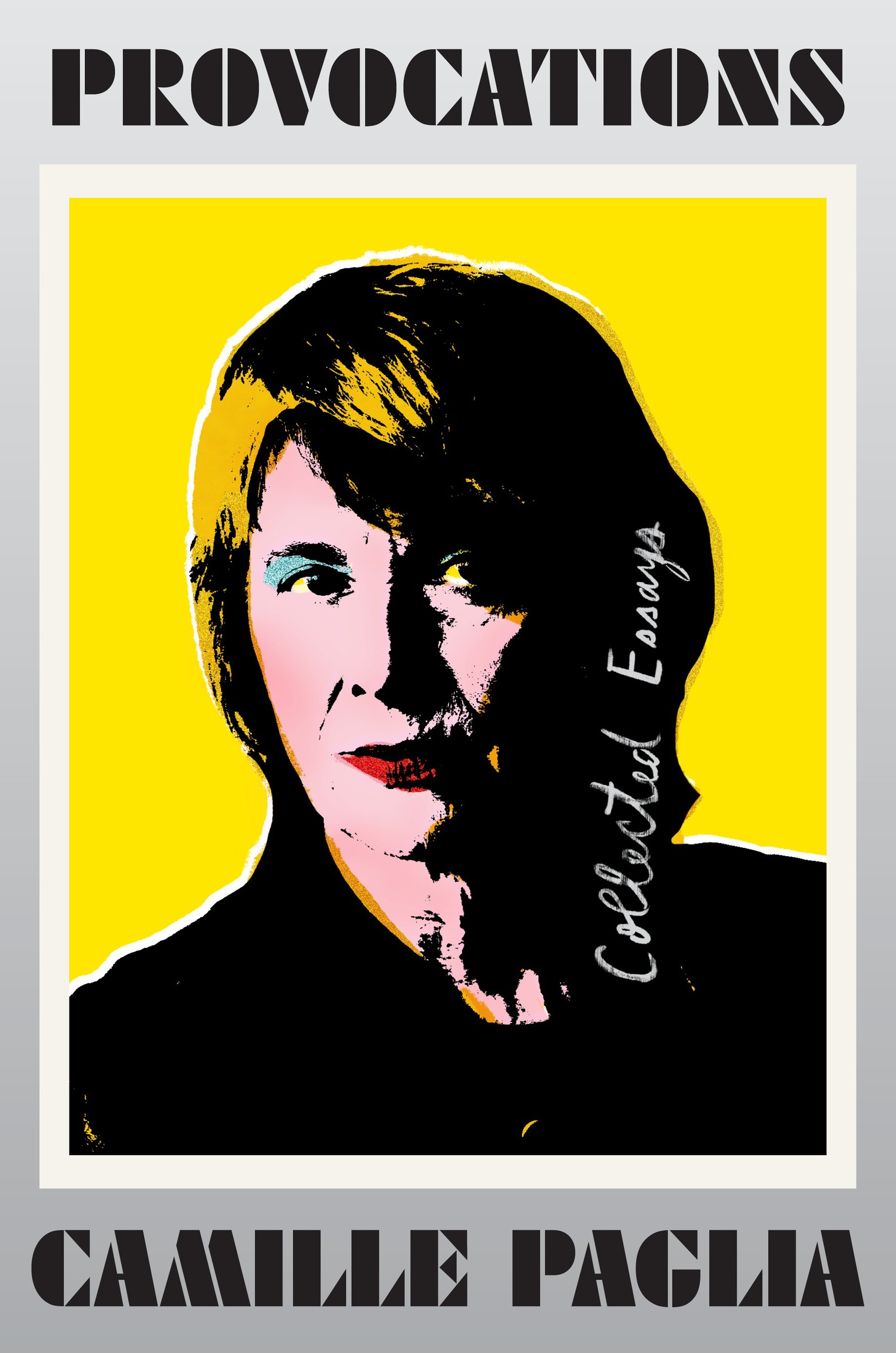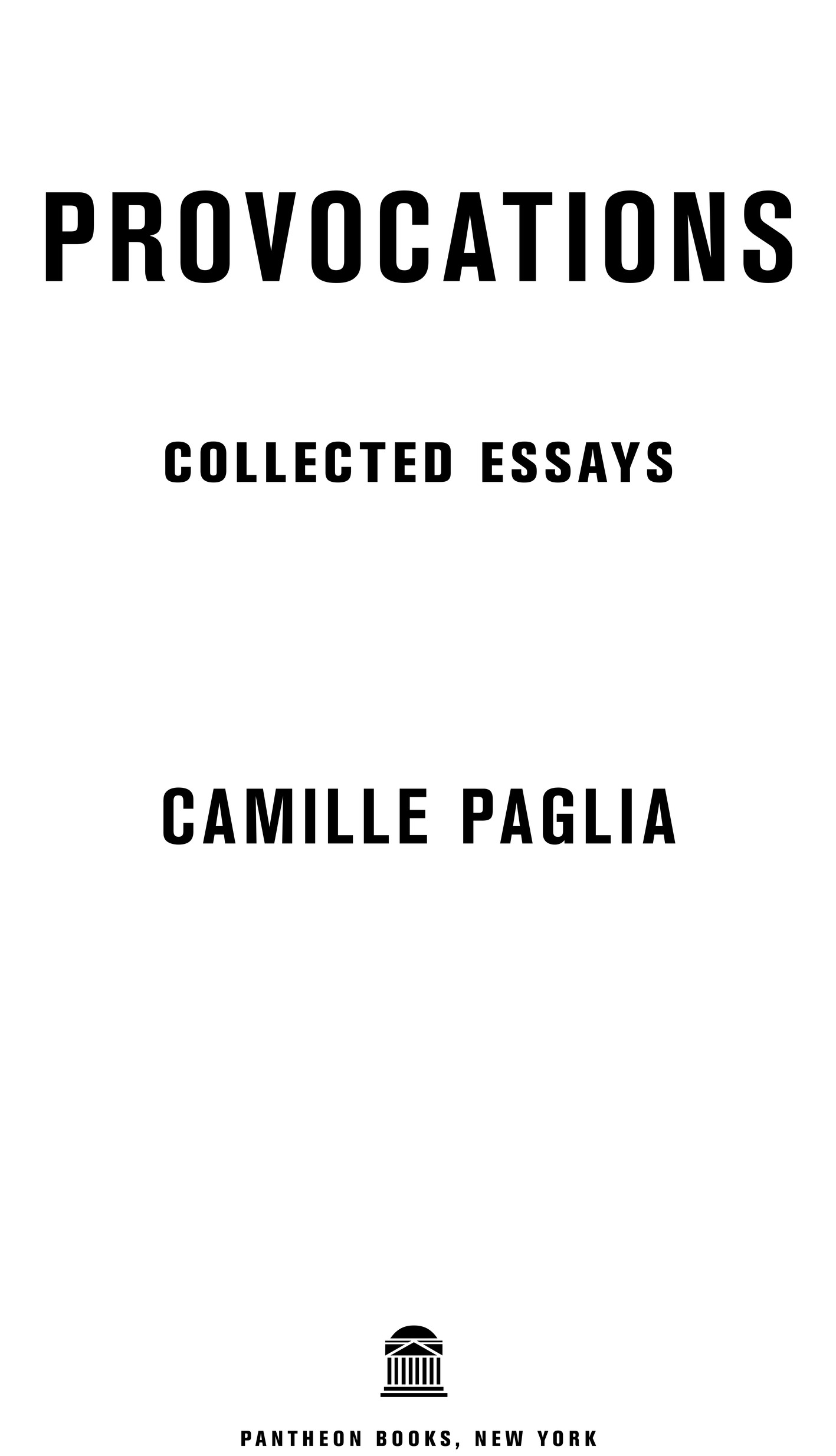A LSO BY C AMILLE P AGLIA
Free Women, Free Men: Sex, Gender, Feminism
Glittering Images: A Journey Through Art from Egypt to Star Wars
Break, Blow, Burn: Camille Paglia Reads Forty-three of the Worlds Best Poems
The Birds
Vamps & Tramps: New Essays
Sex, Art, and American Culture: Essays
Sexual Personae: Art & Decadence from Nefertiti to Emily Dickinson
Compilation copyright 2018 by Camille Paglia
All rights reserved. Published in the United States by Pantheon Books, a division of Penguin Random House LLC, New York, and distributed in Canada by Random House of Canada, a division of Penguin Random House Canada Limited, Toronto.
Pantheon Books and colophon are registered trademarks of Penguin Random House LLC.
Information on previous publication, permissions acknowledgments, and illustration credits appears on pages 703713.
Library of Congress Cataloging-in-Publication Data
Name: Paglia, Camille, [date] author.
Title: Provocations : collected essays / Camille Paglia.
Description: New York : Pantheon, 2018. Includes index.
Identifiers: LCCN 2018005846. ISBN 9781524746896 (hardcover). ISBN 9781524747619 (ebook).
Subjects: LCSH: Popular cultureUnited StatesHistory20th century. United StatesIntellectual life21st century. Arts, American21st century. BISAC: SOCIAL SCIENCE / Womens Studies. SOCIAL SCIENCE / Feminism & Feminist Theory. SOCIAL SCIENCE / Essays.
Classification: LCC E169.12 .P325 2018 | DDC 306.0973/0904dc23 | LC record available at lccn.loc.gov/2018005846
Ebook ISBN9781524747619
www.pantheonbooks.com
Cover design by Janet Hansen
v5.3.2
ep
Contents
INTRODUCTION
This book is not for everyone.
It is not for those who believe that they and their friends, allies, political parties, or churches have found the absolute truth about mankind, present or future.
It is not for those who believe that language must be policed to serve what they view as a higher social good, nor is it for those who grant to government and its proxies on college campuses the right to require and enforce correct thinking.
It is not for those who believe that art is a servant of political agendas or philanthropic goals or that it contains hidden coercive messages that must be exposed and destroyed.
It is not for those who see women as victims and men as the enemy or who think that women are incapable of asserting their rights and human dignity everywhere, including the workplace, without the intervention and protection of authority figures deputized by the power of the state.
It is not for those who see human behavior as wholly formed by oppressive social forces and who deny the shadowy influence of evolution and biology on desire, fantasy, and anarchic impulse, from love to crime.
This book is instead for those who elevate free thought and free speech over all other values, including material considerations of wealth, status, or physical well-being.
It is for those who see art and the contemplation of art as a medium of intuition and revelation, a web work of meaning that should be enhanced and celebrated and not demeaned by teachers who cynically deny the possibility of meaning.
It is for those who see women as mens equals who, in their just and necessary demand for equality before the law, do not plead for special protections for women as a weaker sex.
It is for those who see nature as a vast and sublime force which mankind is too puny to control or alter and which fatefully shapes us as individuals and as a species.
It is for those who see life in spiritual terms as a quest for enlightenment, a dynamic process of ceaseless observation, reflection, and self-education.
A premise of this book, following the great cultural revolution of the 1960s, which was thwarted by the reactionary and elitist forces of academic postmodernism, is that higher consciousness transcends all distinctions of race, class, and gender. Sixties multiculturalism was energized by a convergence of influences from world religionsboth Buddhism (a legacy of the Beat writers) and Hinduism, which suffused popular music. Standard interpretation of the radical 1960s in exclusively political terms is a common but major error that I address in detail in an essay collected here, Cults and Cosmic Consciousness: Religious Vision in the American 1960s.
Although I am an atheist, I have immense admiration and respect for religion as a comprehensive symbol-system, far more profound in its poetry, insight, and metaphysical sweep than anything currently offered by secular humanism. In my Cornerstone Arts Lecture at Colorado College, Religion and the Arts in America (also collected here), I demonstrate how central religion has been to American culture and how its emotionally expressive and multiracial gospel tradition remains the principal reason for Americas continued world dominance in commercial popular music.
I have argued for decades that true multiculturalism would be achieved in education not by splintering the curriculum into politicized fiefdoms but by making comparative religion the core curriculum of world education. An early piece on this subject (published in my first essay collection, Sex, Art, and American Culture in 1992) was East and West: An Experiment in Multiculturalism, a chronicle of an interdisciplinary humanities course that I co-taught with artist and social activist Lily Yeh at the University of the Arts. In the present volume, the same theme is addressed in my opening statement for a 2017 debate at the Yale Political Union, Resolved: Religion Belongs in the Curriculum.
Provocations covers the two and a half decades since my last general essay collection, Vamps & Tramps, in 1994. Some of my articles and lectures on sex, gender, and feminism were published separately a year ago in Free Women, Free Men. The latter volume contains my 1991 New York Newsday op-ed on date-rape that caused prolonged controversy as the first public protest against an escalating hysteria around that issue on college campuses and in the media. I continue to espouse my code of street-smart feminism, which frankly acknowledges the risks and dangers of life and encourages women to remain eternally vigilant and alert and to accept responsibility for their choices and adventures.
However, as the generations pass since the sexual revolution launched in 1960 by the release of the first birth-control pill, discourse about sex has become progressively more ideological, rigid, and banal. The feminist rejection of Freud as sexist has eliminated basic tools of psychological analysis once standard in cultural criticism. Few young adults with elite school degrees today appear to realize how romantic attractions and interactions often repeat patterns rooted in early family life. Nor do they seem to have heard of the complex principle of ambivalence, which produces mixed messages that can disastrously complicate social encounters.
In my first book, Sexual Personae (1990), I wrote extensively about the tormented fragility of male sexual identitywhich most feminist theory, with its bitterly anti-male premises, seems incapable of recognizing. Too often, women fail to realize how much power they have over men, whose ambition and achievement in the public realm are often wedded to remorseless anxiety and insecurity. Canonical feminist theory has also missed the emotional and conceptual symbolism in sexual behavioras in the infantile penile displays of entertainment industry moguls who appear to have routinely chosen as targets women who would show embarrassment, confusion, or fear and not those who would laugh, scold, or whack that tender member with the nearest shoe, purse, hairbrush, or lamp. Interpreting such pathetically squalid scenes in exclusively political rather than psychological terms does not help women to make their way through the minefield of a professional world that will always be stressful, competitive, and uncertain for aspirants of both sexes.




